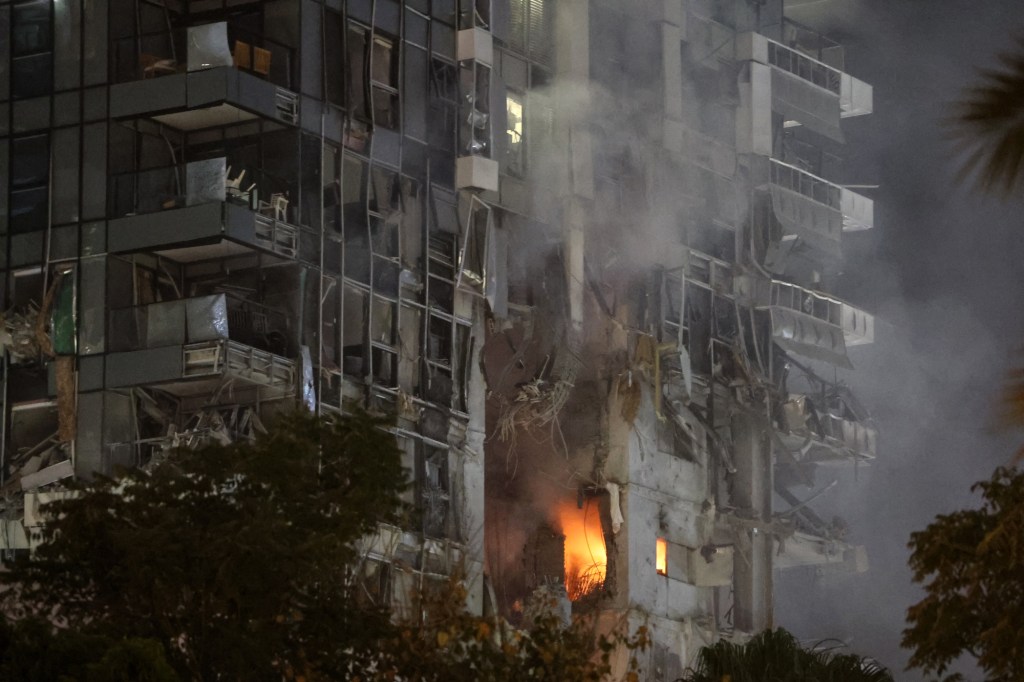The US embassy in Tel Aviv has been damaged by an Iranian ballistic missile attack which landed close by, raising the prospect of President Trump retaliating against Tehran.
The overnight incident, during a barrage of Iranian missiles fired at Tel Aviv and the port city of Haifa, came after Trump warned the US would attack Iran with its “full force” if any American assets were targeted.
The prospect of a military response to the overnight damage to the American embassy building is possible but unlikely
It seemed the building was not directly targeted but the blast from the missiles caused minor damage at the branch office building. Mike Huckabee, the US ambassador to Israel, confirmed the damage overnight but said no one had been hurt. “Some minor damage from concussions of Iranian missile hits near the embassy branch in Tel Aviv but no injuries to US personnel,” he said in a post on X. He said the embassy in Jerusalem and the offices in Tel Aviv would remain closed.
In his warning to Tehran, Trump had said: “If we are attacked in any way, shape or form by Iran, the full strength and might of the US armed forces will come down on you at levels never seen before.”
Since Israel’s attacks on Iran’s nuclear plants and air defense systems, codenamed Operation Rising Lion, began on June 13, Trump has made it clear that the US is not involved, although a report by Reuters claimed that the President had vetoed an Israeli plan to assassinate Iran’s Supreme Leader Ayatollah Ali Khamenei.
“Have the Iranians killed an American yet? No. Until they do we’re not even talking about going after the political leadership,” a senior US official told Reuters.
Washington’s hesitation to participate in the latest round of Israeli raids on Iran suggests that minor, indirect damage to the embassy building in Tel Aviv will not provoke Trump into retaliating against Tehran.
Yet it could persuade the President to mount a full-scale defense of Israel, using warships in the Red Sea and Mediterranean and Patriot missile batteries located in the Middle East to help Israel shoot down the ballistic missiles and drones targeting Israeli cities.
Israel’s Iron Dome and Arrow 2 and 3 anti-missile systems have successfully shot down a large percentage of Iran’s missiles and drones. However, dozens have breached the missile shield, leading to multiple casualties.
When the tit-for-tat missile strikes erupted between Israel and Iran in April, the US, Britain, France and Jordan stepped in to support Israel with anti-missile defenses.
This time, it has not been made clear how much support has been provided. US European Command moved two destroyers with anti-missile systems to the Eastern Mediterranean last week which may already have played a role in intercepting Iranian missiles. The UK also sent additional fighter jets and air refueling tankers to the Middle East.
Trump’s response to the damage caused to the US embassy building in Tel Aviv is likely to be measured by the desire not to escalate an already dangerous confrontation between Israel and Iran.
During his first term in office in June 2019, he approved plans to strike Iran after the Iranians shot down a long-range US Air Force Global Hawk surveillance drone.
Bombers were on their way to hit selected targets when the President changed his mind and the raid was called off. Later, Trump explained that no Americans had been hurt and retaliatory strikes which could have led to Iranian deaths, were, therefore, disproportionate.
Now, in his second term, and following his warning to Iran, the prospect of a military response to the overnight damage to the American embassy is possible but unlikely.
The calm statement from Ambassador Mike Huckabee suggests the response will be more cautious.

























